Trauma-Informed Support for the Foster Care/Adoption Community
The Restore Network exists to change the culture of foster care in Illinois and equip God’s people to meet the needs of vulnerable children and youth. The children we serve have experienced relational and developmental harm that has resulted in changes to their biology, brain, body, beliefs, and behaviors. The supports and resources we offer are created to equip caregivers, volunteers, child welfare professionals, and our church partners to navigate the joys and complexities of caring for these vulnerable children. The resources we offer are based on the principles of Trust Based Relational Intervention created by the Karyn Purvis Institute of Child Development at Texas Christian University as well as other areas of attachment theory and relational neuroscience which we believe line up with how God created our brain and bodies for relationship and the design plan for human flourishing.
Episodes
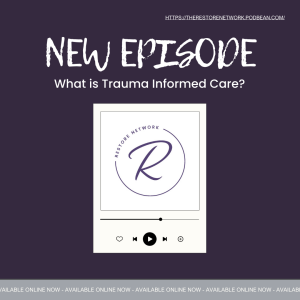
Friday Jan 03, 2025
Friday Jan 03, 2025
In this first episode of a new series of conversations in 2025 by our Director of Trauma Informed Care, we answer the question, "What is trauma informed care?" and "Why does it matter?" The episode covers the 7 risk factors (in utero exposure, birth trauma, early hospitalizations, neglect, abuse, other trauma, and foster care system impacts) and how complex developmental trauma impacts the 5 B's (brain, body, biology, behaviors & beliefs).
If you are a foster/adoptive parent, a volunteer who supports our families, a church partner, or a child welfare worker, please join us in this new series of conversations created specifically for you and your role in changing the culture of foster care in Illinois.
Episode references:
The Connected Child book by Dr. Karyn Purvis: https://www.amazon.com/Connected-Child-healing-adoptive-family/dp/0071475001
Karyn Purvis Institute of Child Development: child.tcu.edu
TBRI Animate: https://www.youtube.com/watch?v=FWScSJKjn1A
What Happened to You? Conversations on Trauma, Resilience, and Healing: www.amazon.com › What-Happened-You-Understanding

Thursday Jul 11, 2024
Thursday Jul 11, 2024
This resource is the audio recording for our Say it with Scripts print resource that you can find here: https://https://therestorenetwork.org/say-it-with-scripts/
The Restore Network exists to change the culture of foster care and equip God's people to meet the needs of vulnerable children and youth. The children we serve have experienced complex developmental trauma and their experiences have changed their brains, bodies, beliefs, and behaviors. These resources are created to equip caregivers, volunteers, child welfare professionals, and our church partners to navigate the joys and complexities of caring for these vulnerable children. The resources we offer are based on the principles of Trust Based Relational Intervention created by the Karyn Purvis Institute of Child Development at Texas Christian University as well as other areas of attachment theory and relational neuroscience which we believe line up with how God created our brain and bodies for relationship and the design plan for human flourishing.
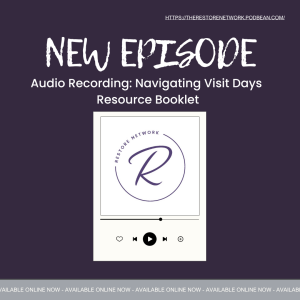
Thursday Jul 11, 2024
Thursday Jul 11, 2024
This resource is the audio recording for our Navigating Visit Days print resource that you can find here: https://therestorenetwork.org/visit-days/
The Restore Network exists to change the culture of foster care and equip God's people to meet the needs of vulnerable children and youth. The children we serve have experienced complex developmental trauma and their experiences have changed their brains, bodies, beliefs, and behaviors. These resources are created to equip caregivers, volunteers, child welfare professionals, and our church partners to navigate the joys and complexities of caring for these vulnerable children. The resources we offer are based on the principles of Trust Based Relational Intervention created by the Karyn Purvis Institute of Child Development at Texas Christian University as well as other areas of attachment theory and relational neuroscience which we believe line up with how God created our brain and bodies for relationship and the design plan for human flourishing.
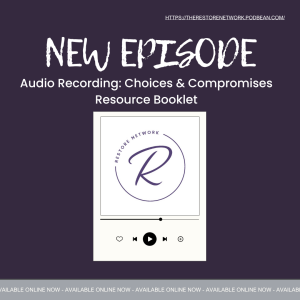
Wednesday Jul 10, 2024
Wednesday Jul 10, 2024
This resource is the audio recording for our Choices & Compromises print resource that you can find here: https://therestorenetwork.org/choices-compromises/
The Restore Network exists to change the culture of foster care and equip God's people to meet the needs of vulnerable children and youth. The children we serve have experienced complex developmental trauma and their experiences have changed their brains, bodies, beliefs, and behaviors. These resources are created to equip caregivers, volunteers, child welfare professionals, and our church partners to navigate the joys and complexities of caring for these vulnerable children. The resources we offer are based on the principles of Trust Based Relational Intervention created by the Karyn Purvis Institute of Child Development at Texas Christian University as well as other areas of attachment theory and relational neuroscience which we believe line up with how God created our brain and bodies for relationship and the design plan for human flourishing.
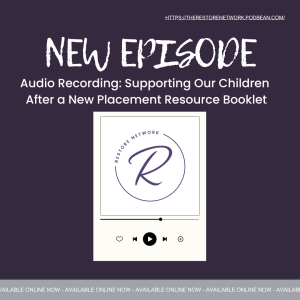
Wednesday Jul 10, 2024
Wednesday Jul 10, 2024
This resource is the audio recording for our Supporting Our Children After a New Placement print resource that you can find here: https://therestorenetwork.org/supporting-our-children-after-a-new-placement/
The Restore Network exists to change the culture of foster care and equip God's people to meet the needs of vulnerable children and youth. The children we serve have experienced complex developmental trauma and their experiences have changed their brains, bodies, beliefs, and behaviors. These resources are created to equip caregivers, volunteers, child welfare professionals, and our church partners to navigate the joys and complexities of caring for these vulnerable children. The resources we offer are based on the principles of Trust Based Relational Intervention created by the Karyn Purvis Institute of Child Development at Texas Christian University as well as other areas of attachment theory and relational neuroscience which we believe line up with how God created our brain and bodies for relationship and the design plan for human flourishing.
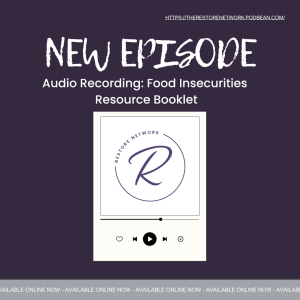
Tuesday Jul 09, 2024
Tuesday Jul 09, 2024
This resource is the audio recording for our Food Insecurities print resource that you can find here: https://therestorenetwork.org/food-insecurities/
The Restore Network exists to change the culture of foster care and equip God's people to meet the needs of vulnerable children and youth. The children we serve have experienced complex developmental trauma and their experiences have changed their brains, bodies, beliefs, and behaviors. These resources are created to equip caregivers, volunteers, child welfare professionals, and our church partners to navigate the joys and complexities of caring for these vulnerable children. The resources we offer are based on the principles of Trust Based Relational Intervention created by the Karyn Purvis Institute of Child Development at Texas Christian University as well as other areas of attachment theory and relational neuroscience which we believe line up with how God created our brain and bodies for relationship and the design plan for human flourishing.
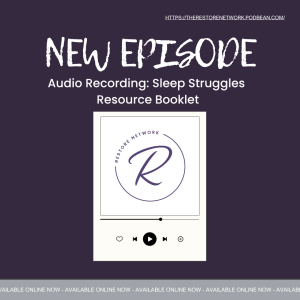
Tuesday Jul 02, 2024
Tuesday Jul 02, 2024
This resource is the audio recording for our Sleep Struggles print resource that you can find here: https://therestorenetwork.org/sleep-tips/
The Restore Network exists to change the culture of foster care and equip God's people to meet the needs of vulnerable children and youth. The children we serve have experienced complex developmental trauma and their experiences have changed their brains, bodies, beliefs, and behaviors. These resources are created to equip caregivers, volunteers, child welfare professionals, and our church partners to navigate the joys and complexities of caring for these vulnerable children. The resources we offer are based on the principles of Trust Based Relational Intervention created by the Karyn Purvis Institute of Child Development at Texas Christian University as well as other areas of attachment theory and relational neuroscience which we believe line up with how God created our brain and bodies for relationship and the design plan for human flourishing.

Monday Jun 24, 2024
Monday Jun 24, 2024
This resource is the audio recording for our Back To School print resource that you can find here: https://therestorenetwork.org/back-to-school/
The Restore Network exists to change the culture of foster care and equip God's people to meet the needs of vulnerable children and youth. The children we serve have experienced complex developmental trauma and their experiences have changed their brains, bodies, beliefs, and behaviors. These resources are created to equip caregivers, volunteers, child welfare professionals, and our church partners to navigate the joys and complexities of caring for these vulnerable children. The resources we offer are based on the principles of Trust Based Relational Intervention created by the Karyn Purvis Institute of Child Development at Texas Christian University as well as other areas of attachment theory and relational neuroscience which we believe line up with how God created our brain and bodies for relationship and the design plan for human flourishing.
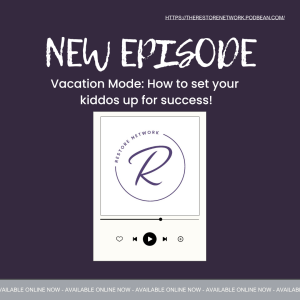
Tuesday Jun 11, 2024
Tuesday Jun 11, 2024
In this recording we address the trickiness of taking kids with histories of developmental trauma on vacation. Vacations might be a new experience for your kid and with that might come some unease and fears. Take a listen to Ashley Bennett, our Director of Trauma Informed Care, encourage us to have the right mindset for these trips and put in place some things that will help our kids to experience felt-safety and remain or return to regulation while vacationing. We hope if you give some of these ideas a try, you'll be able to find some joy on your upcoming trip! Happy travels!
The Restore Network exists to change the culture of foster care and equip God's people to meet the needs of vulnerable children and youth. The children we serve have experienced complex developmental trauma and their experiences have changed their brains, bodies, beliefs, and behaviors. These resources are created to equip caregivers, volunteers, child welfare professionals, and our church partners to navigate the joys and complexities of caring for these vulnerable children. The resources we offer are based on the principles of Trust Based Relational Intervention created by the Karyn Purvis Institute of Child Development at Texas Christian University as well as other areas of attachment theory and relational neuroscience which we believe line up with how God created our brain and bodies for relationship and the design plan for human flourishing.
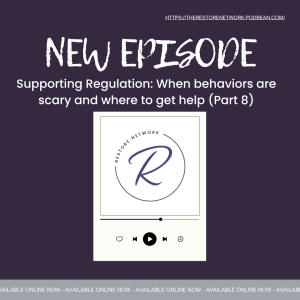
Friday Feb 16, 2024
Friday Feb 16, 2024
In part 8 of an 8 part series, Ashley Bennett, our Director of Trauma Informed Care, explains a new lens to see some of our biggest scariest moments of dysregulation and offers us some new ways to support our most vulnerable children. She also wraps this series up with where to go to get helps so you don't walk this path alone. Take a listen to part 8 (or go check out parts 1-7 first!).
The Restore Network exists to change the culture of foster care and equip God's people to meet the needs of vulnerable children and youth. The children we serve have experienced complex developmental trauma and their experiences have changed their brains, bodies, beliefs, and behaviors. These resources are created to equip caregivers, volunteers, child welfare professionals, and our church partners to navigate the joys and complexities of caring for these vulnerable children. The resources we offer are based on the principles of Trust Based Relational Intervention created by the Karyn Purvis Institute of Child Development at Texas Christian University as well as other areas of attachment theory and relational neuroscience which we believe line up with how God created our brain and bodies for relationship and the design plan for human flourishing.
